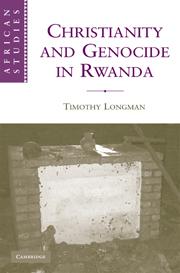| Listing 1 - 1 of 1 |
Sort by
|

ISBN: 9780521191395 0521191394 9780511642043 9780521269537 9780511641411 0511641419 0511638973 9780511638978 9780511636523 0511636520 9780511757976 0511757972 0511642040 0511847548 9780511847547 1107188687 9781107188686 0511640730 9780511640735 1282386360 9781282386365 9786612386367 6612386363 0511640056 9780511640056 051163790X 0521269539 Year: 2010 Publisher: Cambridge Cambridge University Press
Abstract | Keywords | Export | Availability | Bookmark
 Loading...
Loading...Choose an application
- Reference Manager
- EndNote
- RefWorks (Direct export to RefWorks)
Although Rwanda is among the most Christian countries in Africa, in the 1994 genocide, church buildings became the primary killing grounds. To explain why so many Christians participated in the violence, this book looks at the history of Christian engagement in Rwanda and then turns to a rich body of original national- and local-level research to argue that Rwanda's churches have consistently allied themselves with the state and played ethnic politics. Comparing two local Presbyterian parishes in Kibuye before the genocide demonstrates that progressive forces were seeking to democratize the churches. Just as Hutu politicians used the genocide of Tutsi to assert political power and crush democratic reform, church leaders supported the genocide to secure their own power. The fact that Christianity inspired some Rwandans to oppose the genocide demonstrates that opposition by the churches was possible and might have hindered the violence.
Genocide --- Ethnic relations --- Génocide --- Relations interethniques --- History --- Religious aspects --- Christianity --- Christianity. --- Histoire --- Aspect religieux --- Christianisme --- Rwanda --- Atrocities. --- Religious aspects. --- Atrocités --- Arts and Humanities
| Listing 1 - 1 of 1 |
Sort by
|

 Search
Search Feedback
Feedback About UniCat
About UniCat  Help
Help News
News